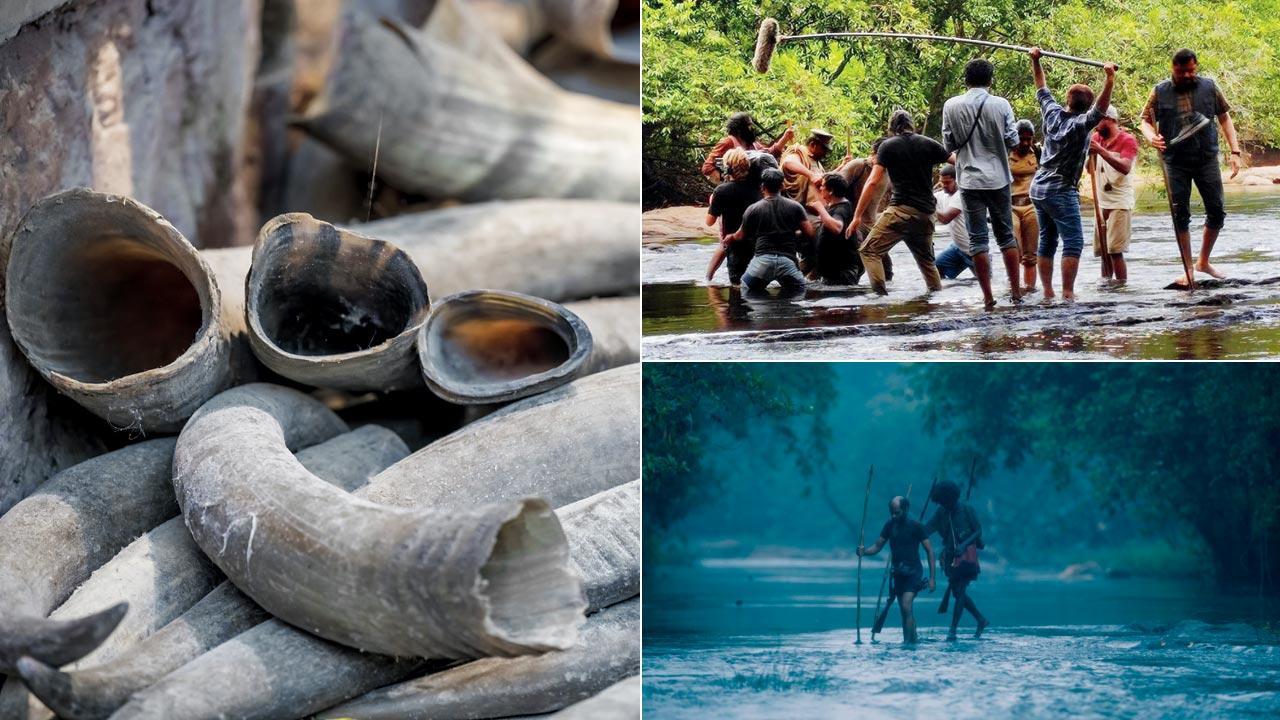What does it take to make an investigative docuseries on one of India’s largest ivory poaching rings? Years of research, months in the jungles, and a seat in the animal’s head

In the past three years, 90 cases of seizure of elephant tusks/ivory have been reported in India along with 29 cases of poaching of elephants, according to the data shared by the Ministry of Environment, Forest and Climate Change (MOEFCC) ; A still from Poacher; A behind the scenes look during filming. Aiding the shoot at every step along the way was a robust safety crew which knew how to navigate the forest
It is ironic that in the same week that Richie Mehta released his latest web mini-series, Poacher on Amazon Prime Video, Congress leader Rahul Gandhi’s Bharat Jodo Nyay Yatra skipped Wayanad, his own constituency, where protests had brought life to a standstill after an elephant strayed from Karnataka across the border and killed resident guide VP Paul.
ADVERTISEMENT
The radio-collared wild elephant pursued and trampled the 47-year-old inside a fenced property in a residential zone in Pulpally. The local residents have accused the forest and revenue department authorities of negligence. This is the third death in three weeks in Kerala thanks to a wild elephant attack. Rising incidence of man-animal conflict is being attributed to decline in quality of forest habitat with commercial species like eucalyptus overtaking natural vegetation that are animal food sources. Shrinking habitat due to construction and waste disposal near forested areas are adding to the mess.
We are chewing on government statistics for 2022-23 on the day that we have an interview scheduled with the Canadian film director and writer. Close to 8,873 attacks by wild animals, including 4,193 by elephants, 1,524 by wild boars, 193 by tigers, 244 by leopards, and 32 by bison, in one year alone. Among the 98 reported fatalities, 27 are from elephant attacks. In the last three years, 90 cases of elephant tusks/ivory seizure have been reported in India along with 29 cases of elephant poaching, according to the Ministry of Environment, Forest and Climate Change (MOEFCC).
 Richi Mehta
Richi Mehta
It is 8 am in London, which is where he is currently, when we call. Poacher is an investigative crime series inspired by India’s largest ivory poaching raid. And its protagonist is an unsuspecting farmer who finds himself at the centre of trouble after stealing blood ivory from a gang of international terrorists. Mehta, though, refuses to pigeonhole his story into good and evil. “The one thing that I, as a filmmaker, don’t so, is judge. I don’t judge the poacher, the kingpin. The characters judge each other; I stand outside the ambit and present my understanding of their opinions. Empathy must exist for all sides. [Then] We can understand why people do what they do.” Mehta says that this time he tried the impossible, trying to get into the mind of the animal at the centre of the crime. He wonders, “Has anyone ever factored in the point of view of the elephant? Conflict leads to disturbance. The psychological hit that the animal takes. Empathy drives change. I did the same with Delhi Crime. We all hated the act [murder-gang rape] and its gruesomeness. But how do we make sure it doesn’t happen again?”
Mehta’s understanding of India’s wildlife and its shrinking habitat comes from the world he inhabited for six months in the jungles of Panthapra and Kuttumpuzha. For two years before that, he was researching and writing. “I was the Trojan Horse for the project. I went in, met the people and stayed there. We employed a large local workforce. But the idea was to never impose our view; we wanted to work with the people who belong to that world. I was clear that this was a story about Kerala and her people. Everyone there knew the region better than me, and I took cues. The locals were baffled why we were so fascinated. For them, it is a generational story,” Mehta says, remembering how a chat with a local resident even gave him a line of dialogue. “In Episode 2… ‘The forest is a treasure that must be protected’.”
Poacher, starring Nimisha Sajayan, Roshan Mathew and Dibyendu Bhattacharya, and backed by Bollywood actor Alia Bhatt who comes on board as executive producer, is based on the true story of Operation Shikar, a mission that unfolded between 2015 and 2017 thanks to the confession of a local forest watcher who told the Kerala Forest Department officials how a multi-gang poaching racket that he had assisted was behind the death of 20 elephants in barely two years across Thundathil, Vazhachal, Parambikulam and Munnar wildlife sanctuaries. The Wildlife Trust of India, the state’s forest department, and the police helmed one of India’s biggest wildlife crime investigations that led to the recovery of 400 kilos of ivory.
How did Mehta blend fact and fiction? “The people I met became the story. The real people who have inspired the characters of Mala [Sajayan] and Alan [Mathew], I spent most time with. The forest watcher who confessed... I also met him. These were clandestine meetings in the forest, because he was a prosecution witness. He laid it all down for me--what he did, his modus operandi, his reasons. The sixth episode is all about him and the poachers. Mala’s character, I created by piecing together the lives of many people… one person’s backstory, another’s trajectory. And these were all men.” Mehta points out that the world of the jungle is a big boy’s club and he was mindful of this while writing. “When the eighth episode unfolds, viewers will understand why Mala had to be a woman. One of the forest officers I met called theirs an all-male force. I wanted to change that [in the series]. I have met so many admirable women crusaders.”
It was officials from WTI, in fact, who connected Mehta with the range officer who has inspired Mala’s character. “That officer became my entry point into the world of wildlife crime and protection. We also had biologists on the team. One of them was obsessed with dogs; he had seven dogs, all rescued. It inspired the many dogs who are Mala’s pets in the series. I thought the forest department would have experts in law and enforcement alone, but they dozens from all disciplines, including scientists. I consider myself lucky at having met the best of them.”
 Subscribe today by clicking the link and stay updated with the latest news!" Click here!
Subscribe today by clicking the link and stay updated with the latest news!" Click here!







